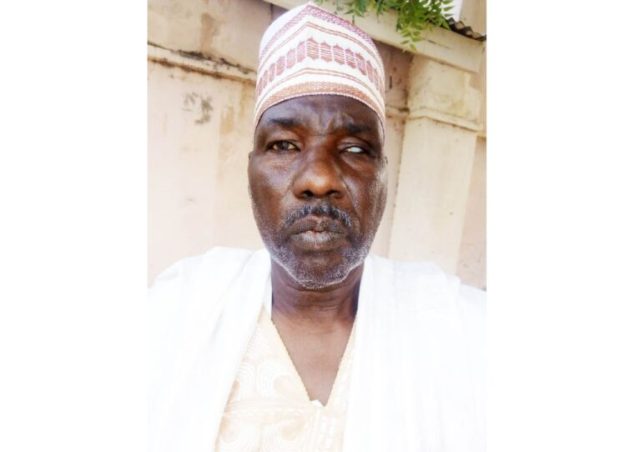 Alhaji Garba Shu’aibu Gashuwa (born 1957) is a contemporary Nigerian Hausa poet.
Alhaji Garba Shu’aibu Gashuwa (born 1957) is a contemporary Nigerian Hausa poet.
Early life
Alhaji Garba Shu’aibu Gashua, who is popularly known as “Garba Gashuwa”, is a contemporary Nigerian Hausa poet, businessman, politician and a retired civil servant, born in Gasamu, in present-day Jakusko Local Government Area of Yobe State, North-Eastern Nigeria in 1957, to his father Sālisu and mother Salāmatu. Gashuwa’s father was a native of Badawa (Bade) and had four children, namely Sa’idu, Isa, Garba (the third), and Musa. Today, Garba Gashuwa resides in Kano with his family and has many children; among them is Musa Garba Gashuwa, a talented and popular composer.
Education
In conformity with the general practice among Muslims communities in Hausaland, Gashuwa’s education started at the age of two when he attended a traditional Qur’anic school in Gasamu. On graduating he moved to Gashuwa, where he studied hadith, fiqh and other subjects related to Islamic knowledge. Gashuwa did not enroll in any formal Western school, but learnt from friends how to read and write in the Roman script. Gashuwa is also a polyglot.
Career
Business
After completing his studies, the young Gashuwa, started a business in Bade town selling Islamic books such as Qawa’idi, Yasin Arashada, Iza-waqa, Ahalari and Dala’ilul Khairati.[5] Apart from being a book vendor, he was also at one time a shoe vendor and a mai dinkin hula (a Hausa traditional cap-stitcher). He lived in Lagos for many years in pursuit of these entrepreneurial ventures.
Civil service
Gashuwa’s civil service career began when he eventually relocated and settled in Kano at the request of the late Malam Aminu Kano. His first appointment by the Kano State Government was at Caji Aliyu Sabo Bakin Zuwo,. He worked there until 1989, when the State’s military administrator Colonel Idris Garba, requested his transfer to the Kano State History and Culture Bureau, where he served as an adviser. He worked at the Bureau until he rose to the position of a member of its Board of Directors, a position he held from 1989 to 1995. He retired from service in 1995 and devoted his life to composing Hausa poems in Ajami script.TV-67’s Cultural Section, during the administration of Alh
Poetry
Gashuwa was inspired by Abdu Nguru, a poet of his acquaintance, and later started on Islamic subjects such as Isra’i & Mi’iraj, and the miracles and death (wafaat) of the Prophet Muhammad. His works are normally penned in the Hausa Ajami script.
He started writing political poems during the 1978 campaign tour of National President of the People’s Redemption Party, Malam Aminu Kano, held in Gashua and its environs. As a result, Aminu Kano invited Garba Gashuwa to reside in Kano, for him to continue making his contribution to political developments of the time.[8] Whenever Gashuwa chanted his political poems, his audiences would chant the chorus, clapping their hands.[9] Besides religion and politics, Gashuwa wrote on other subjects and, so far, has more than 1,000 Hausa Ajami poems to his name.
Themes, language and style of Gashuwa’s poems
Initially, Hausa poets used (and still use) the sixteen Arabic metres adopted from Arabic prosody in their composition. Today, some poets choose styles and themes that are modern, although the influence of Arabic poetry is still visible. Gashuwa bases most of his poetry on the rhythms of legendary Hausa singer and musician, Dr. Mamman Shata of Katsina, with themes including religion, politics, social issues, education, and traditional culture.
In the use of language and poetic devices, “the language of his poems is simple and apt to be understood by the average Hausa”. He also make use of Arabic and English loanwords, dialect, proverbs and innuendo to express his points. Above all, Gashuwa always opens and closes his poem with a doxology, no matter the motif. Sometimes his poems are to be accompanied by hand clapping. For Gashuwa “an effective political poem should be chanted in a pleasant voice, accompanied by hand clapping, and should contain proverbs”; he holds that this will surely attract an audience’s attention. Below is an example of proverb in his poem named Ɗan Hakin da ka Raina, “The Little Grass That You Despise”. This poem is in ƙwar biyar, pentastich form, with “bᾱ” as the external rhyme.







